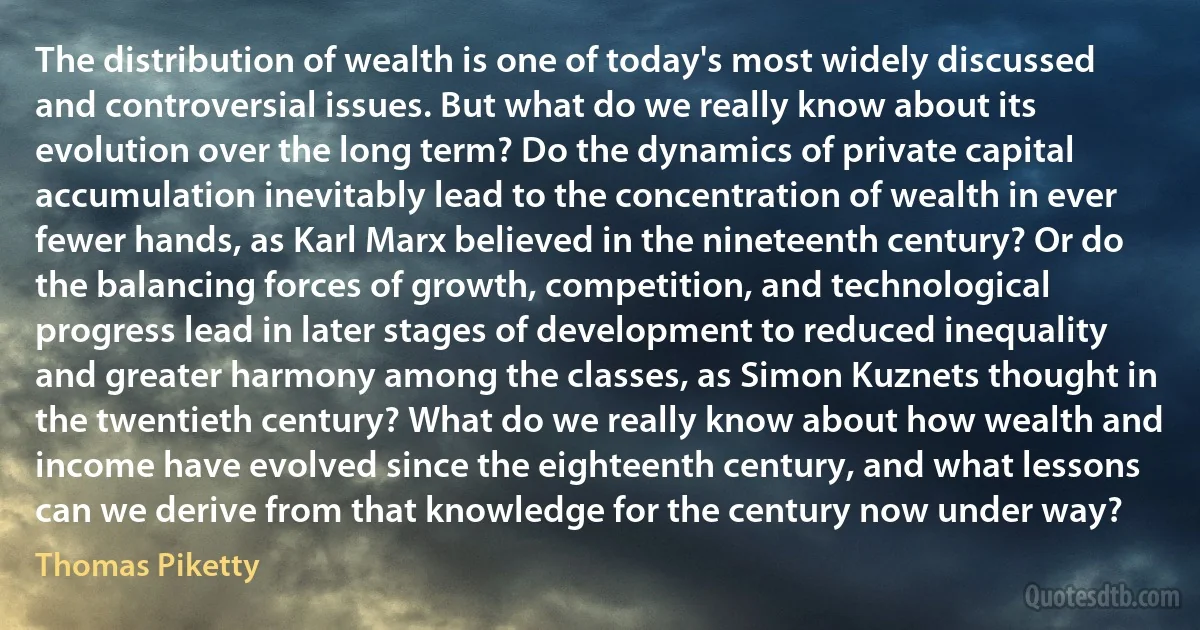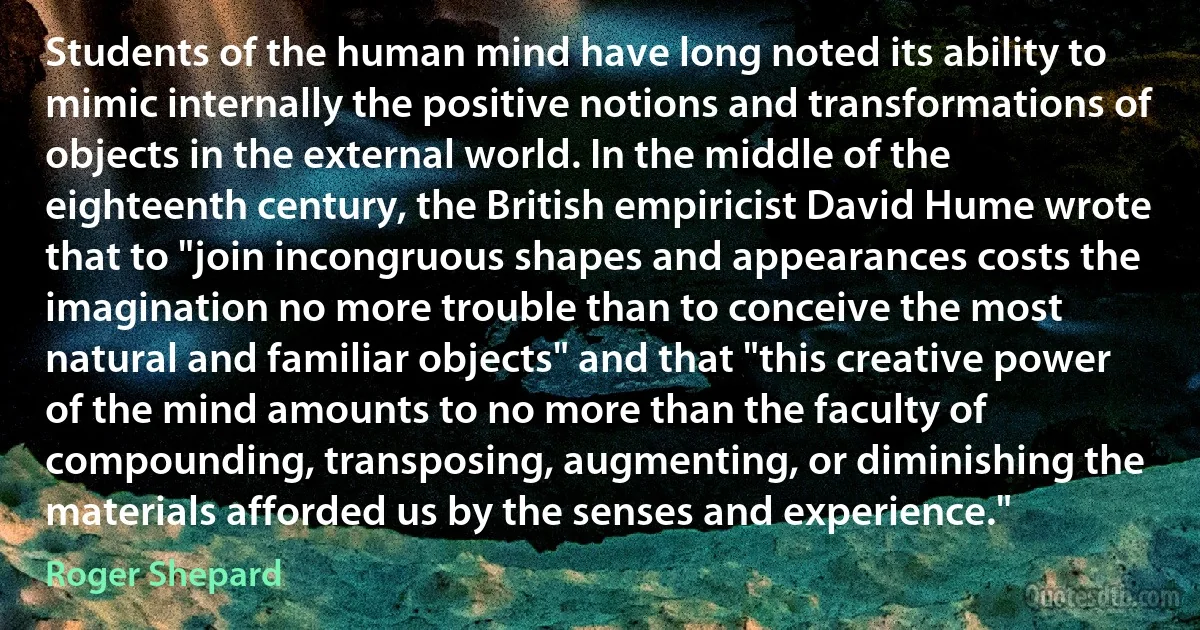Eighteenth Quotes - page 3
In my eighteenth year, my father sent me to the University of Gottingen. The first winter I did not leave the Anatomical School, and although I gave myself up to the most intense study, I willingly entered into all the gaities and amusements so much sought by German students, but avoided carefully debaucheries of any kind; they gave me the cognomen, Half Benommist, owing to my puerile look and feeble and weak voice. Unzer and Ebeling, two students in physic, took me under their powerful protection, and extricated me out of many scrapes.

Albrecht Thaer
After Plotinus, says Schassler, fifteen centuries passed without the slightest scientific interest for the world of beauty and art. ...In reality, nothing of the kind happened. The science of aesthetics ... neither did nor could vanish, because it never existed. ... the Greeks were so little developed that goodness and beauty seemed to coincide. On that obsolete Greek view of life the science of aesthetics was invented by men of the eighteenth century, and especially shaped and mounted in Baumgarten's theory. The Greeks (as anyone may read in Bénard's book on Aristotle and Walter's work on Plato) never had a science of aesthetics.

Leo Tolstoy
I was determined to accept the invitation I had earlier received from General Jaruzelski to go to Poland. I always felt the greatest affection and admiration for this nation of indomitable patriots, whose traditions and distinctive identity the Prussians, Austrians and Russians (in the eighteenth and nineteenth centuries) and the Nazis and communists (in the twentieth century) had sought vainly to extinguish. I could not forget the Polish airmen who had fought with the RAF against Nazism, and how a war begun over the freedom of Poland had ended leaving them trapped under tyranny.

Margaret Thatcher
The eighteenth century called upon man to free himself of all the historical bonds in the state and in religion, in morals and in economics. Man's nature, originally good and common to all, should develop unhampered. In addition to more liberty, the nineteenth century demanded the functional specialization of man and his work; this specialization makes one individual incomparable to another, and each of them indispensable to the highest possible extent. However, this specialization makes each man the more directly dependent upon the supplementary activities of all others. Nietzsche sees the full development of the individual conditioned by the most ruthless struggle of individuals; socialism believes in the suppression of all competition for the same reason. Be that as it may, in all these positions the same basic motive is at work: the person resists to being leveled down and worn out by a social technological mechanism.

Georg Simmel
The major vehicle of for the transition to the capitalist mode of production was the textile industry of eighteenth - century England. In cloth production mercantile wealth was visibly transformed into capital, as it acquired the dual function of purchasing machines and raw materials, on the one hand, and buying human energy to power their operation on the other.

Eric Wolf
So Sen is right that democracy can be pressed into the service of reducing injustice. Indeed this can happen against expectations. Had there been neoclassical economists around in the late eighteenth century, they would have scoffed at the possibility of abolishing the slave trade. In the absence of a system of multilateral enforcement, Britain had to bear the enormous expense unilaterally-over several decades-without any obvious prospect of a return. whether democracy fosters or hinders economic growth.

Ian Shapiro
Just as the unleashing of ideas and myths in the seventeenth and eighteenth centuries cleared the way for endless changes in state and social structures, so the subsequent pinning down and splitting up of language into feudal states has now made it impossible for the citizen to participate seriously in society. The inviting humanist irony of the early days has given way to the off-putting rational cynicism and sloganeering of our time.

John Ralston Saul
The overall importance of capital today, as noted, is not very different from what it was in the eighteenth century. Only its form has changed: capital was once mainly land but is now industrial, financial, and real estate. We also know that the concentration of wealth remains high, although it is noticeably less extreme than it was a century ago. The poorest half of the population still owns nothing, but there is now a patrimonial middle class that owns between a middle and a third of total wealth, and the wealthiest ten percent now own only-two thirds of what there is to own rather than nine-tenths.

Thomas Piketty
Isaac Newton deserves to be included in a series of companions to major philosophers even though he was not a philosopher in the sense in which Descartes, Locke, and Kant were philosophers. That is, Newton made no direct contributions to epistemology or metaphysics that would warrant his inclusion in the standard list of major philosophers of the seventeenth and eighteenth centuries – Descartes, Spinoza, Locke, Leibniz, Berkeley, Hume, and Kant – or even in a list of other significant philosophers of the era – Bacon, Hobbes, Arnauld, Malebranche, Wolff, and Reid. The contributions to knowledge that made Newton a dominant figure of the last millennium were to science, not to philosophy.

I. Bernard Cohen
Gradually, during the eighteenth century, physicists and philosophers had become so accustomed to Newton's law of gravitation, and to the equality of gravitational and inertial mass, that the miraculousness of it was forgotten and only an acute mind like Bessel's perceived the necessity of repeating those experiments. By the experiments of Bessel about 1830 and of Eötvös in 1909 the equality of gravitational and inertial mass has become one of the best ascertained empirical facts in physics.

Willem de Sitter
Gradually... during the second half of the nineteenth century, the uncomfortable feeling of dislike of the action at a distance, which had been so strong in Huygens and other contemporaries of Newton, but had subsided during the eighteenth century, began to emerge again, and gained strength rapidly.
This was favoured by the purely mathematical transformation (which can be compared in a sense with that from the Ptolemaic to the Copernican system), replacing Newton's finite equations by the differential equations, the potential becoming the primary concept, instead of the force, which is only the gradient of the potential. These ideas, of course, arose first in the theory of electricity and magnetism or perhaps one should say in the brain of Faraday.

Willem de Sitter
Einstein's theory has the very highest degree of æsthetic merit: every lover of the beautiful must wish it to be true. It gives a vast unified survey of the operations of nature, with a technical simplicity in the critical assumptions which makes the wealth of deductions astonishing. It is a case of an advance arrived at by pure theory: the whole effect of Einstein's work is to make physics more philosophical (in a good sense), and to restore some of that intellectual unity which belonged to the great scientific systems of the seventeenth and eighteenth centuries, but which was lost through increasing specialization and the overwhelming mass of detailed knowledge. In some ways our age is not a good one to live in, but for those who are interested in physics there are great compensations.

Hendrik Lorentz
To the scientists of 1850, Hamilton's principle was the realization of a dream. ...from the time of Galileo scientists had been striving to deduce as many phenomena of nature as possible from a few fundamental physical principles. ...they made striking progress ...But even before these successes were achieved Descartes had already expressed the hope and expectation that all the laws of science would be derivable from a single basic law of the universe. This hope became a driving force in the late eighteenth century after Maupertuis's and Euler's work showed that optics and mechanics could very likely be unified under one principle. Hamilton's achievement in encompassing the most developed and largest branches of physical science, mechanics, optics, electricity, and magnetism under one principle was therefore regarded as the pinnacle of mathematical physics.

Morris Kline
Meister Eckhart, the German churchman and mystic of the fourteenth century; Giovanni Pico della Mirandola in the fifteenth; Jacob Boehme, a German, in the sixteenth and seventeenth; Emanuel Swedenborg in the seventeenth and eighteenth. We are spiritually free, they said, the stewards of our own evolution. Humankind has a choice. We can awaken to our true nature. Drawing fully from our inner resources we can achieve a new dimension of mind; we can see more.

Marilyn Ferguson
Towards the close of the eighteenth century, Johann Gottfried Herder boldly proclaimed this idea, asserting that each age and every people embody ideals and capacities peculiar to themselves, thus allowing a fuller and more complete expression of the multiform potentialities of humankind than could otherwise occur. Herder expressly denied that one people or civilization was better than another. They were just different, in the same way that the German language was different from the French.

William H. McNeill
Before the eighteenth century the demographic impact of the profession of medicine remained negligible. Relatively few persons could afford to pay a doctor for his often very expensive services; and for every case in which the doctor's attendance really made a difference between life and death, there were other instances in which even the best available professional services made little difference to the course of the disease, or actually hindered recovery. ...Only with the eighteenth century did the situation begin to change; and it was not until after 1850 or so that the practice of medicine and the organization of medical services begin to make large-scale differences in human survival rates and population growth.

William H. McNeill



